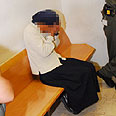
One harrowing case after another, yet welfare officials stand by helpless: Faced with a string of heart wrenching cases of child abuse in the haredi community, even state officials now concede that they have only been able to reach this closed community on rare occasions, and often too late.
One recent, disturbing case, for instance, in which a Netivot mother had sexually abused her son, only came to light when the son began to attend boarding school and molested a fellow pupil. The social workers who handled his case quickly realized that the child had no idea that what he was doing was wrong.
Dalia Lev-Sade, director of community services at the Ministry of Labor and Social Affairs, stated in an interview with Ynet that seeing as the haredi community is so sequestered, haredi children enjoy less exposure to societal conventions of right and wrong.
“This is a group that is extremely closed off from the rest of the world, and so many times we are unaware of problems within the community and cannot intervene.”
“The case in Beit Shemesh is a classic example,” recounts Lev- Sade. ”Even though the family was monitored by welfare services, the social workers involved could not fully understand the family, nor the essence of the problems it was facing, because they kept such closely guarded family secrets. Only when something drastic occurs can we actually begin to take action.”
The ultra-Orthodox community, however, is slowly becoming more open, according to Lev-Sade. “The haredi community is slowly opening up and coming to realize that you can’t keep the skeletons in the closet forever.”
Orlet Moyal, director of welfare services at the Bnei Brak Municipality, tends to haredi families on a daily basis and knows all too well that that road to reaching this clandestine community is long and torturous. “It was nearly impossible to reach the haredi community just a few years ago, but we began to come up with creative means of reaching this community without offending its sensibilities.
“We wanted to be able to reach the haredi community before things became disastrous,” says Moyal, "and so we contacted local rabbis and rabbinical councils and urged them to mediate and intervene when families were reluctant to accept help.”
'More willingness to report abuse'
Dr. Yitzhak Kadman, head of the National Council for the Child, believes that it is the closed and reticent nature of the haredi community that in many instances precludes intervention by state authorities in child abuse cases.
“The haredi community firmly opposes airing its dirty laundry out in public, like we saw with many kibbutz communities in the past. The haredi community is extremely concerned about its public images, and in many cases rabbis did not allow families to go to the police and report abuse.”
Kadman noted, however, that this trend is mercifully changing. “In recent years there is more willingness among haredi families to report abuse. In our council alone, 30% of individuals involved in a project tending to victims of sexual abuse are haredi.”
Doron Aggasi, director of the Shlom Banecha foundation, which aids victims of sexual abuse and violence in the haredi community, stated that the recent public cases of child abuse within the haredi community indicate that the haredi world is changing for the better when it comes to reporting such crimes.
“These kinds of cases were often stifled in the past, because the haredi community was unwilling to disclose anything. Now however, people are far more aware of issues such as sexual abuse and familial violence, be it through exposure to the internet or other sources.”
Aggasi maintains that it is rabbis that are at the forefront of these positive changes in the haredi community.
“Rabbis have asked me about the best treatment options for pedophilia and sexual deviance, and we are currently training social workers to treat both victims and perpetrators.
"In this respect, the haredi community has bypassed its secular counterpart by far, because this is a very motivated, obedient society that has taken heavy handed measures to help curb such phenomenon.”
Roi Mandel contributed to this article















